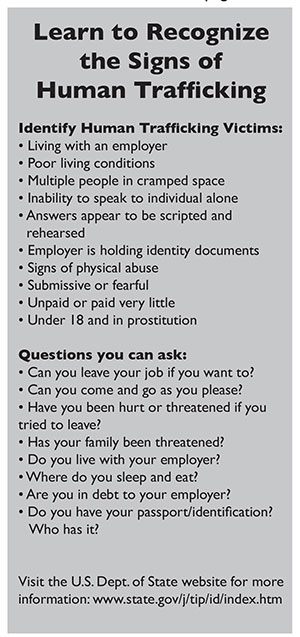Houston named a major hub for human sex trafficking
Ashley Honc
The Signal
At age 10, Maria’s family was promised a job, education and better life for their daughter in Houston. Little did they know that it was the beginning of a dangerous scam lasting more than eight years.
Maria was constantly watched, sexually exploited, threatened, beaten and endlessly in debt to her owner. Maria and her family’s experience are far from sporadic; traffickers prey upon millions of people in the U.S. alone.

“Twenty-one million people in the United States are in bondage for human trafficking. Roughly 16.5 million people are in labor trafficking and 4.5 million people in sex trafficking,” said Tim Johnson, chair of Locke Lord’s White Collar Criminal Defense and International Investigations.
One out of every five of those victims resides in Texas.
The second largest criminal industry in the world, human trafficking is defined as the recruitment or illegal trade of a person for involuntary labor or sexual exploitation. It is essentially modern-day slavery.
Of the twenty-one million captives in human trafficking, Houston Rescue and Restore Coalition indicate that between 14,500 and 17,500 of those individuals are brought into the U.S. every year from other countries.
Maria, a victim of this growing epidemic, is one of the lucky ones: she escaped. Now in her early twenties, Maria appeared at the 27th Law & Media Seminar in downtown Houston Feb. 2. It was there she voiced her story to raise awareness about human trafficking and also to help her cope with the suffering she has experienced.
Fleeing from gangs in her homeland in Central America, Maria was sent to Houston for the opportunity of a better life and to help support those back home. It was not long until she realized her family had trusted the wrong person. The man who helped her get to America became her “owner” and cut off all ties she had with her family.
For years Maria was beaten and sold to men as a sex slave by her owner/pimp working mainly out of a Houston cantina.
“He forced me to put on the clothes and showed me how to act,” said Maria as she vividly recalls her first time at the cantina. “That night I was with 10 men.”
“Cantina-related trafficking cases have involved victims from Central America and Mexico – often children or young women – who were kidnapped, beaten or otherwise coerced into prostitution,” says Lise Olsen, an investigative reporter for the Houston Chronicle with 20 years experience on crime, corruption and human rights issues. Common in Houston, cantina cases are not as typical elsewhere.
Many efforts have been made to help stop this rising criminal industry. In 2000, Congress passed the Trafficking Victims Protection Act (TVPA), declaring human trafficking of all kinds a federal crime. In 2004, Houston founded the Human Trafficking Rescue Alliance to further address human trafficking. The most recent act was passed in 2008. The William Wilberforce Trafficking Victims Protection Reauthorization Act enhanced federal efforts to deal with international and domestic trafficking.
Even with these laws, human trafficking continues to grow and even occurs at mainstream places.
“There are credible allegations from advocates and from city and county officials that Houston’s strip clubs and massage parlors are centers for human trafficking,” Olsen said.
Houston is considered a main hub for human trafficking. It is close to the Mexican border, and has an international airport and interstates running through it.
During her imprisonment, Maria became pregnant and regularly saw a doctor. Too scared to reach out for help, her exploitation remained unnoticed.
“I was angered that doctors didn’t know I was being exploited,” Maria said.
Finally free, Maria still battles with nightmares and hallucinations from her past.
The case to convict her captor is still being investigated. If her sex trafficker is prosecuted, he faces up to life in prison with a minimum sentence of 10 years.
Targets are not only illegal immigrants or children; anyone who is uneducated on this issue can become a victim. In fact, Super Bowl Sunday has been exposed as one of the “largest human trafficking incidents in the U.S.,” said Texas Attorney General Greg Abbott in a public statement.
Children at Risk, a nonprofit organization that advocates change for children, warns major sporting events provide a great demand for the commercial sex industry and traffickers often travel to these events to fill that demand.
“It’s equal opportunity slavery,” says Maria Trujillo, executive director for the Houston Rescue and Restore Coalition. “Becoming aware is the best way to stop human trafficking.”
There are many warning signs that can indicate possible human trafficking. The U.S. State Department notes some key signs to look for are: an employee living with an employer, signs of physical abuse and an inability of the person to speak to individuals alone. More resources can be found at http://www.state.gov/j/tip/index.htm.
If you believe you recognize someone as a possible victim of human trafficking, alert law enforcement immediately or call the National Human Trafficking Resource Center at 1-888-373-7888.

